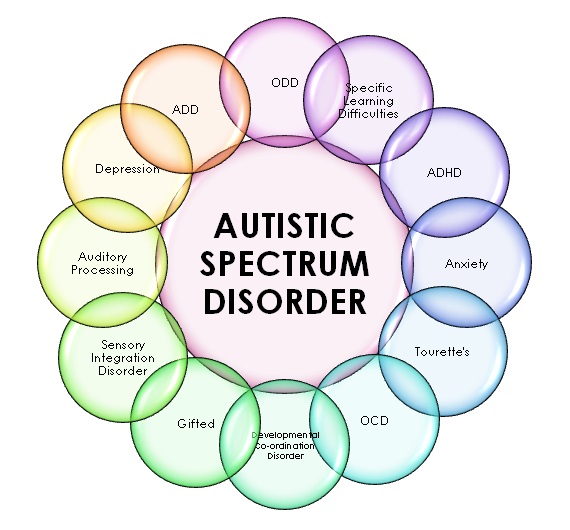Autism Spectrum Disorder (ASD) is a neurological and developmental disorder which affects communication and behavior. Autism can be diagnosed at any age. But still it is called a “developmental disorder” because symptoms generally appear in the first two years of life. Autism affects affects the overall cognitive, emotional, social and physical health of the affected individual.
Autism is called as a “spectrum” disorder because there is wide variation in the type and severity of symptoms people experience.
What Happens in Autism Spectrum Disorder?
The exact cause of Autism Spectrum Disorder is so far unknown. There is no one single cause. However, following aspects may increase the risk:
- Family history
- Genetic mutations
- Fragile X syndrome and other genetic disorders
- Being born to older parents
- Low birth weight
- Metabolic imbalances
- Exposure to heavy metals and environmental toxins
- Fetal exposure to the medications valproic acid (Depakene) or thalidomide (Thalomid)

Symptoms of Autism Spectrum Disorder
- Abnormal Body Posturing or Facial Expressions
- Abnormal Tone of Voice
- Avoidance of Eye Contact or Poor Eye Contact
- Behavioral Disturbances
- Deficits in Language Comprehension
- Delay in Learning to Speak
- Flat or Monotonous Speech
- Inappropriate Social Interaction
- Intense Focus on One Topic
- Lack of Empathy
- Lack of Understanding Social Cues
- Learning Disability or Difficulty
- Not Engaging in Play With Peers
- Preoccupation With Specific Topics
- Problems With Two-Way Conversation
- Repeating Words or Phrases
- Repetitive Movements
- Self-Abusive Behaviors
- Sleep Disturbances
- Social Withdrawal
- Unusual Reactions in Social Settings
- Using Odd Words or Phrases
Does Vaccination cause ASD?
No. A number of studies have been conducted to see whether there is a link between any vaccine and Autism. None, of the studies showed any such link.
Can ASD be Prevented?
No. Autism can not be prevented. But with treatment can improve behavior, skills and language development.
Diagnostic and Statistical Manual of Mental Disorders, Fifth Edition (DSM-5)
The DSM-5 was published on 18 May 2013. autism and less severe forms of the condition, including Asperger syndrome and pervasive developmental disorder not otherwise specified (PDD-NOS), have been combined into the diagnosis of autism spectrum disorder (ASD).
Therefore, now Asperger syndrome is no longer considered a separate syndrome. Now, it is part of ASD.
Population of People with Autism
- In 2015, globally more than 24.8 million people were estimated to be affected with Autism, while Asperger syndrome affected a further 37.2 million.
- Autism occurs four-to-five times more often in males than females.
- In the developed countries, about 1.5% of children are diagnosed with ASD as of 2017.
ICD-10 Code for Autism Spectrum Disorder
For Autism Spectrum Disorder, the ICD-10-CM Diagnosis Code is F84.0
F84.0 code is a billable/specific ICD-10-CM code that can be used to indicate a diagnosis for reimbursement purposes.
For Asperger’s syndrome the ICD-10 code is F84.5
Use the citation below to add this article to your bibliography
"Autism Spectrum Disorder: Disability, Symptoms, Causes." Wecapable.com. Web. June 17, 2025. <https://wecapable.com/autism-spectrum-disorder-disability-symptoms-causes/>
Wecapable.com, "Autism Spectrum Disorder: Disability, Symptoms, Causes." Accessed June 17, 2025. https://wecapable.com/autism-spectrum-disorder-disability-symptoms-causes/
"Autism Spectrum Disorder: Disability, Symptoms, Causes." (n.d.). Wecapable.com. Retrieved June 17, 2025 from https://wecapable.com/autism-spectrum-disorder-disability-symptoms-causes/

Leave a Reply